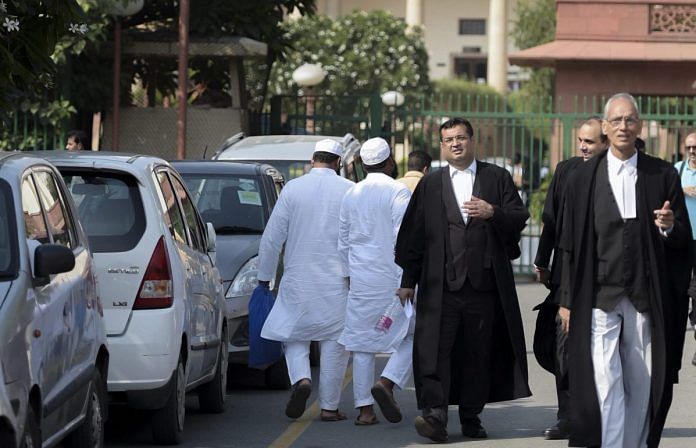The blame for pendency lies at the judiciary’s doorstep.
Justice Ranjan Gogoi, the new Chief Justice of India, has a plan to clear pendency of cases. In his first week as CJI, Gogoi is already being identified as the judge who will dismiss more cases than he would hear.
At least 30 CJIs before Gogoi came with similar plans but pendency has only increased.
So, here’s a radical idea – the Supreme Court needs a professional court manager to run the show efficiently.
A large part of the blame for pendency lies at the judiciary’s doorstep. It is neither wise nor feasible anymore to leave it to the judges to analyse what they are doing wrong, find ways to fix it and implement their action plans.
No accountability for failing to reform
Each CJI announces a plan without stating specifics around the time he takes the oath. However, no one checks the efficacy of the plan when the CJI retires. Like most things in the judiciary, there is no accountability for judges.
Also read: Indian judiciary doesn’t need to fear the government; it needs to be afraid of itself
In any case, the policy is never really made public for critically analysing it. What makes things worse is that the judiciary has chosen to keep itself outside the purview of the Right to Information Act so that there is no way to access figures that the court does not want to tell us.
For example, CJI Dipak Misra made clearing constitutional cases his priority for clearing pendency, continuing with his predecessor T.S. Thakur’s policy. However, before he became the CJI, he entertained all kinds of frivolous PILs, like mandatory playing of the national anthem in cinema halls.
In any case, there is also no method to the madness on what sort of PILs the court entertains. The apex court routinely entertains PIL petitioners who have been previously fined for filing frivolous cases. A strict screening of PILs at the registry is necessary for any pendency plan to work.
Civil liberties cannot depend on plans to tackle pendency
Fundamental rights cannot be sacrificed at the altar of ostentatious pendency plans. Former CJI H.L. Dattu, now chairperson of the National Human Rights Commission, had made it a practice to dismiss appeals including death penalty cases in limine (on procedural grounds without even giving a hearing) in a bid to clear the backlog.
Thursday, CJI Gogoi dismissed advocate Prashant Bhushan’s plea to stall deportation of Rohingyas after hearing him for less than a few minutes.
Also read: Public institutions: What India and US can learn from each other
Legal experts have argued that the court’s delay in hearing the case challenging Aadhaar in a time-bound manner made it fait accompli. The cases were first filed in 2012, challenging a notification of the now-defunct Planning Commission. While the case was pending, Aadhaar enrolments soared and the government had time to fix its legal framework.
Between 2015 and 2017, two CJIs had simply refused to set up a larger bench to decide if the right to privacy is a fundamental right since they could not “spare so many judges” at that time. Smaller two-judge benches of the Supreme Court at that time would often aggressively list a hundred cases before them every day and dispose them.
Such little time, so much to do
A CJI is chosen on the basis of seniority and does not have a fixed tenure. In the last decade, tenures of CJIs have been shorter and this trend will continue for a while. The last time a CJI was around for more than two years was S.H. Kapadia in 2012.
In a tearing hurry to leave a mark, even in such short tenure, each CJI brings his own policy to the table and often ends upturning the previous policies upside down.
In 2014, CJI H.L. Dattu had set up a dedicated tax bench and a social justice bench but his successor T.S. Thakur dismantled them and redistributed the cases before these benches without citing any reasons. Some key cases that were heard at length were disposed of immediately by the new benches.
Thakur’s successor J.S. Khehar revived these benches, again, without giving any reasons of course.
The ad-hoc policy changes worsen the problem than tackle it. Justice Gogoi will hold office for a little more than a year which is very short to usher in any meaningful reform.
Court managers
The idea of professional court managers is mooted by the apex court itself.
“Judiciary is on a ventilator,” the Supreme Court said while directing that a court manager with an MBA must be appointed in every district court of the country to improve judicial functioning. While it is true that 86 per cent of the pendency is in the subordinate courts, the higher courts cannot be left behind.
Also read: Cricket, coal, South Delhi: Economic mess that India’s courts created
CJIs also have other administrative work, from deciding rosters to appointing judges and even signing off on purchases of the court. It is not prudent to think any CJI can fully devote himself/herself to tackle this monstrous problem.
The solution must come from research backed by evidence and not perceptions. Only a dedicated policy with specific targets can make a dent in the pendency of cases. Everything else is just plain rhetoric.




It might help awareness of pendency and create conditions to deal with it effectively if people like Salman Khan were not able to cut through immense traffic jams in a matter of minutes, reach the head of the queue. He would have to serve out his sentence before his appeal could be taken up.